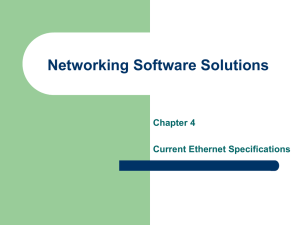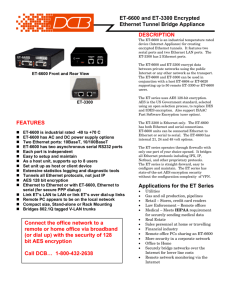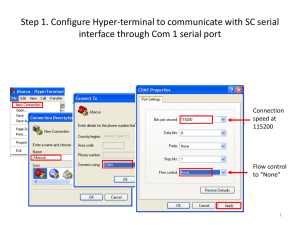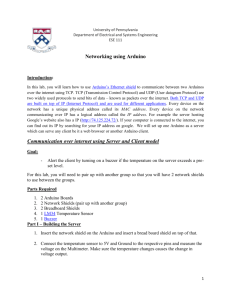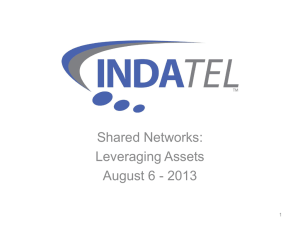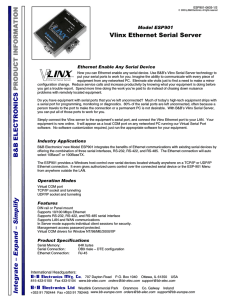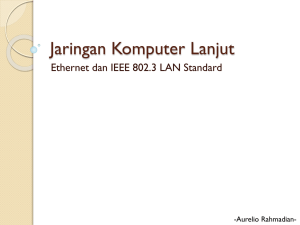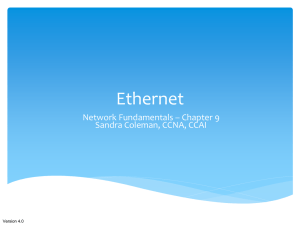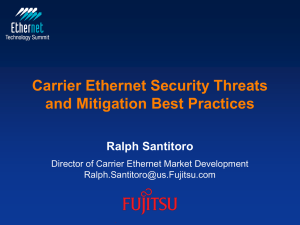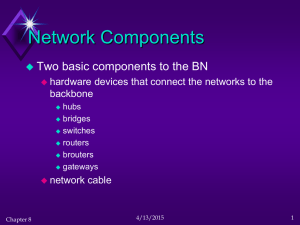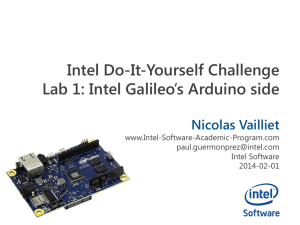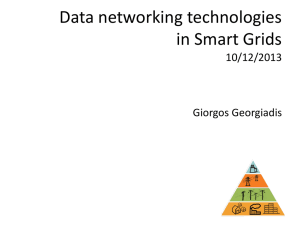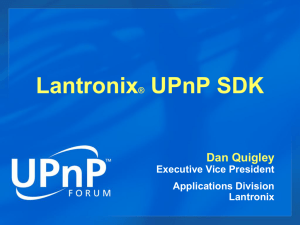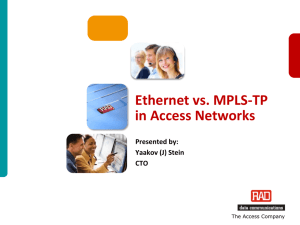IntelAcademic_IoT_03_Networking
advertisement
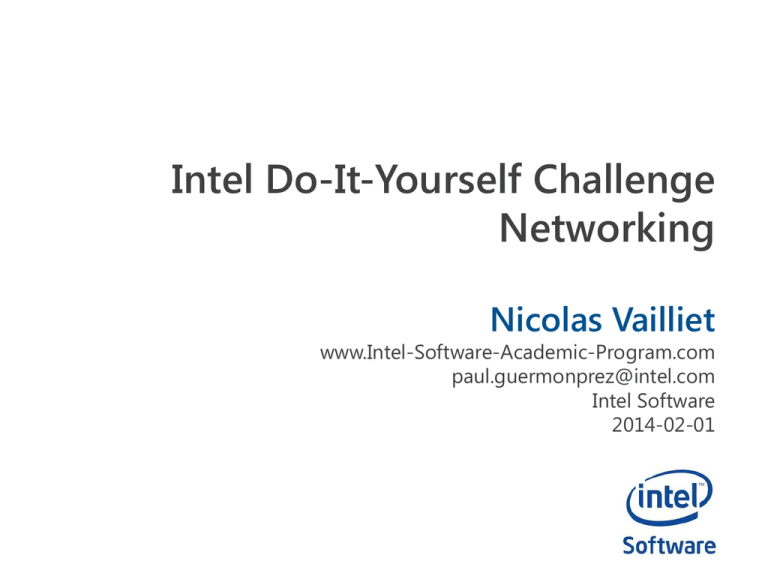
Intel Do-It-Yourself Challenge
Networking
Nicolas Vailliet
www.Intel-Software-Academic-Program.com
paul.guermonprez@intel.com
Intel Software
2014-02-01
Galileo as a linux server
Boot from SD card
There’s an embedded linux on the board,
but you can also boot from a microSD card.
Customize the Yocto build
There’s reference Yocto builds on Intel’s website,
but you can also build your own Yocto
(sources and drivers are available, including for Wi-Fi).
Network
There’s an Ethernet port on the board (on a non-Intel Arduino
board, an Ethernet shield would cost 29euro+VAT),
and MiniPCI-e WiFi cards (laptop-style) can be plugged.
We’ll use …
OS
Ubuntu 12.04 LTS (other Oses are supported)
Galileo IDE and drivers
Intel Galileo Arduino SW (IDE and drivers)
https://communities.intel.com/docs/DOC-22226
Download the “Linux image for SD”
Micro SD card
The micro SD card is not provided in the box.
To plug the SD card on a PC, you’ll need an adaptor.
Preparing and booting the SD card
SD card
Format the micro SD Card
Connect the micro SD card to your PC, format as fat32.
Adapters
To connect the microSD to your PC, you can use :
> A SD-microSD adapter if you have a SD slot in your PC
> A USB-microSD adapter
Boot
Boot loader
The Galileo board is using grub, a common tool, which load
an ext3 file system.
How to boot
Plug the SD card in the slot of the Galileo board.
Plug the power supply, wait for the green LED, plug via USB.
What’s working ?
You can still send sketches from the Arduino IDE, but you
now have a linux running with included services
and libraries like SSHd, bluez, nodejs, OpenCV.
Enable networking
Ethernet
Auto configured
Once booted, Linux OS will start SSH for the first time. Wait
a minute before trying to it. We’ll need to run a sketch from
the Arduino IDE to :
> use the “Ethernet” package to enable the Ethernet port
> launch a ifup linux command with “system” to enable the
interface.
Then your board will receive an IP address from your local
DHCP server (usually your home router),
or will use the fixed IP you provided if DHCP doesn’t work.
Then you’ll be able to connect with ssh
and get rid of the IDE.
Ethernet
Procedure
> Plug the Ethernet cable
> Copy/Paste the sketch on next slide to your IDE window
> Edit the MAC (sticker on your board) and IP values
> Validate and upload.
> Determine your IP address.
> ssh to your Galileo IP as root.
Sketch to copy/paste
#include <SPI.h>
#include <Ethernet.h>
// MAC address for the Galileo (there’s a sticker on the Ethernet connector)
byte mac[] = { 0x??, 0x??, 0x??, 0x??, 0x??, 0x?? };
//the IP address for the Galileo: (will be used if there’s no DHCP server on your network)
byte ip[] = { ???, ???, ???, ??? };
void setup() {
delay(5000);
Serial.println("Attempting to configure Ethernet using DHCP");
if (Ethernet.begin(mac) == 0) {
Serial.begin(9600);
Serial.println("Failed to configure Ethernet using DHCP");
Serial.println("Attempting to configure Ethernet using Static IP");
Ethernet.begin(mac, ip);
Serial.println(" Please check ifconfig");
} else
Serial.println("Sounds good");
system("ifup eth0"); // load Ethernet interface!
}
void loop () {}
What’s my IP ?
What’s my IP address ?
Fixed IP
If you have no DHCP router and entered an IP, you have it.
Router info page
If you have a home router, you can consult the DHCP log.
Display ifconfig output
Run sketch from the following slide, it will :
> run the ifconfig linux command
> output the result in a file
> display the file content
Sketch to copy/paste
char output[500];
void setup(){
Serial.begin(9600);
}
void loop(){
system(“ifconfig > log.txt”);
FILE *fp;
fp = fopen(“log.txt”,”r”);
while(fgets(output,500,fp) != NULL)
Serial.println(output);
fclose(fp);
delay(5000);
}
ssh
ssh
Serial log
After running the sketch, your board should be connected to
your LAN network.
ssh
To access the board with ssh, the user is root, with no password.
ssh root@192.168.1.100
//replace with your IP
You should see :
root@clanton:~#
Reboot ?
If you reboot your card, you should be able to reconnect
automatically. Wait at least 45 seconds for the OS
to load the network and ssh service.
License Creative Commons – By 3.0
You are free:
• to Share — to copy, distribute and transmit the work
• to Remix — to adapt the work
• to make commercial use of the work
Under the following conditions:
• Attribution — You must attribute the work in the manner specified by the author or licensor (but
not in any way that suggests that they endorse you or your use of the work).
With the understanding that:
• Waiver — Any of the above conditions can be waived if you get permission from the copyright
holder.
• Public Domain — Where the work or any of its elements is in the public domain under applicable
law, that status is in no way affected by the license.
• Other Rights — In no way are any of the following rights affected by the license:
–
–
–
•
Your fair dealing or fair use rights, or other applicable copyright exceptions and limitations;
The author's moral rights;
Rights other persons may have either in the work itself or in how the work is used, such as publicity or
privacy rights.
Notice — For any reuse or distribution, you must make clear to others the license terms of this
work. The best way to do this is with a link to this web page.
http://creativecommons.org/licenses/by/3.0/
